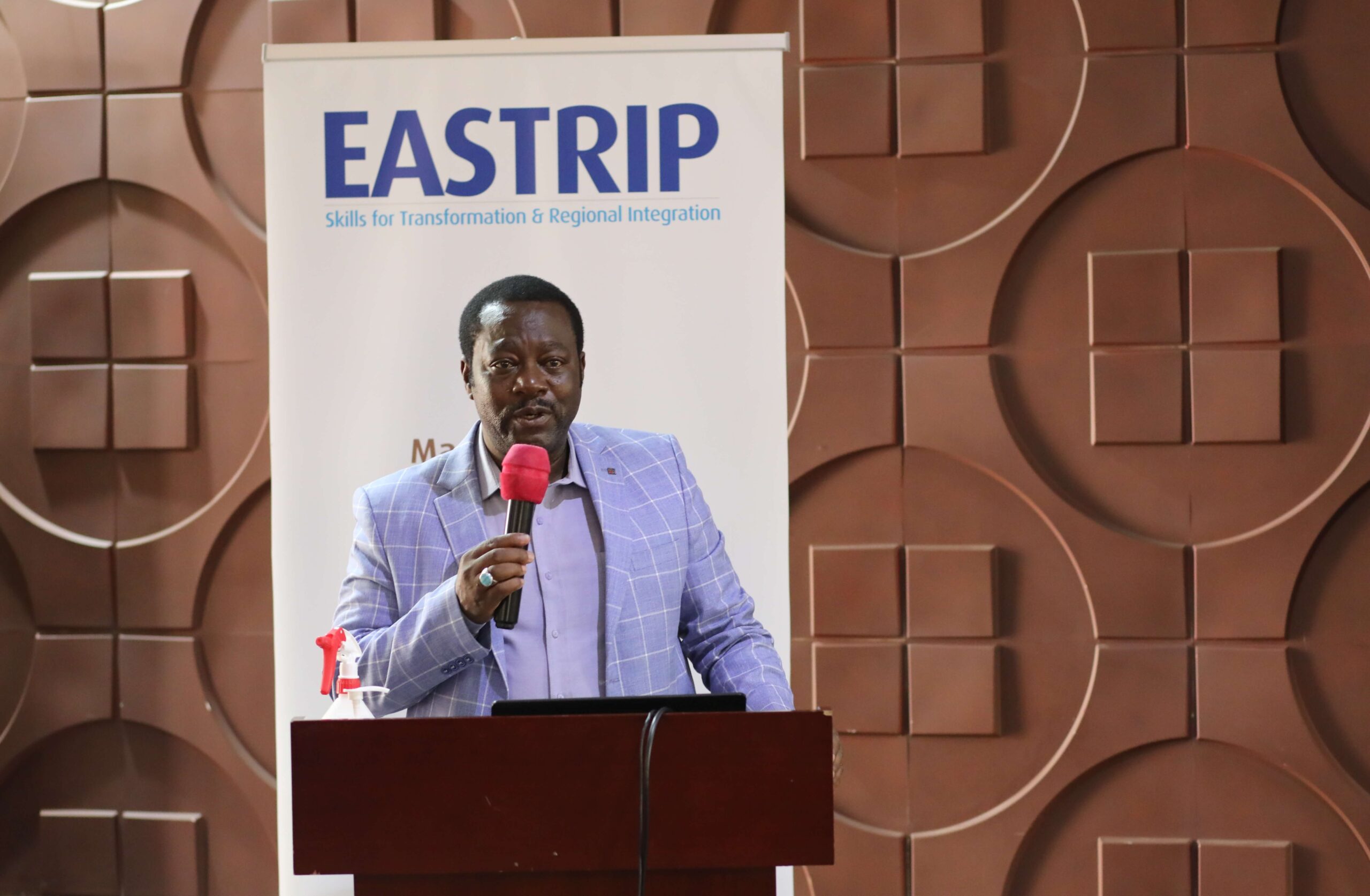The East Africa Skills for Transformation and Regional Integration Project (EASTRIP) is a five-year project funded by the World Bank and the Governments of Ethiopia, Kenya and Tanzania to increase access and improve quality of TVET programs offered by the selected Regional Flagship Technical and Vocational Education and Training (TVET) Institutes (RFTIs). The TVET Journal spoke to the Regional Project Coordinator at Inter University Council for East Africa (IUCEA) about the project.
TVET Journal: Tell us more about the East African Skills for Transformation and Regional Integration Project (EASTRIP)?
The project was launched in June 2019 with USD293 million investment from the World Bank and the Governments of Ethiopia, Kenya and Tanzania. The Project seeks to address skills shortage and mismatch, by providing technical, financial and industry partnerships to improve the relevance and quality of training programmes in the 16 selected Regional Flagship TVET Institutes.
The project supports the development of highly specialized TVET programmes at diploma and degree levels for training of technicians and TVET faculty, as well as industry recognised short-term training, targeting regional priority sectors in transport, energy, manufacturing, and ICT. The 16 Regional Flagship TVET Institutes, 7 in Ethiopia, 5 in Kenya, and 4 in Tanzania will become TVET centres of excellence providing skilled workers in priority sectors required by the economies in the region. We expect these RFTIs to become TVET centres of excellence that trigger and guide continental wide TVET reforms.
In addition, the project’s institutional beneficiaries include the ministries of education and national TVET agencies, more specifically, the Ministry of Skills and Labour and the Federal TVET Agency in Ethiopia; the Ministry of Education (MoE), TVET Authority, and Curriculum Development Assessment and Certification Council (TVET CDACC) in Kenya; and the Ministry of Education, Science and Technology (MoEST), National Council for Technical Education (NACTE), Vocational Education and Training Authority (VETA), and Tanzania Commission for Universities (TCU) in Tanzania.
Through the project, the World Bank and the Governments of Ethiopia, Kenya and Tanzania have committed to provide support and resources to create and implement policies that allow TVET institutions to re-engineer their learning platforms and modes of delivery to meet the dynamic and ever-changing skills requirements of the marketplace. The EASTRIP Project also facilitates regional integration by providing a regional platform to promote exchange of policies and practices, students and faculty mobility and harmonisation of occupational standards and qualifications.
The project is being implemented at three different levels, including RFTIs, national at Ministries responsible for Education and TVET, and regional levels. The Inter University Council for East Africa (IUCEA) hosts the regional component of the project as the Regional Facilitation Unit (RFU).
TVET Journal: What is the role of Inter University Council for East Africa (IUCEA) in the implementation of the East African Skills for Transformation and Regional Integration Project (EASTRIP)?
The Inter University Council for East Africa (IUCEA) is a strategic institution of the East African Community (EAC) responsible for the development of higher education and research in the region. The IUCEA was competitively selected by the World Bank as the Regional Facilitation Unit (RFU) of the East African Skills for Transformation and Regional Integration Project (EASTRIP).
As the RFU we are responsible for coordinating the regional component of the project including supporting project implementation in the 16 Regional Flagship TVET Institutes and the three national TVET systems. It also includes harmonization of TVET occupational standards, in close collaboration with industries, and mutual recognition of qualifications in EASTRIP priority sectors including Manufacturing, Power and Energy, Transport and Infrastructure, and Information and Communication Technology (ICT). We also facilitate staff and student mobility exchange programs, and Monitoring and Evaluation (M&E) the project implementation.
TVET Journal: EASTRIP Priority sectors include Transport and Infrastructure, Power and Energy, Manufacturing, Agro-processing, Information and Communication Technology (ICT). Why did you choose to focus on these sectors for the project?
Countries in East Africa have rolled out several initiatives, including the Northern Corridor Integration Project (NCIP) and the Central Transport Corridor Project. The United Republic of Tanzania and the Republic of Uganda recently signed an agreement to construct the East African Crude Oil Pipeline (EACOP).
In addition, African governments have embraced industrialization as part of the strategy for sustainable economic development and job creation. This has resulted in increased demand for skilled labour to support the growing sector of the economies. However, there is shortage of skilled labour to support key growth sectors of the economy. Skills shortage is particularly acute in the fields of ICT, transport, energy, manufacturing, and agriculture processing. While industry complains about lacking qualified workers, youth unemployment and underemployment is also prevalent.
The EASTRIP Project has focused on these critical sectors of the economy because we believe that they are critical to spur industrialization and support economic development of our nations.
TVET Journal: EASTRIP is in its third year of implementation. What have been some of your major achievements?
Project Implementation: Structures for ensuring effective project implementation have been put in place including establishment of a Regional Steering Committee (RSC) with members from Ethiopia, Kenya and Tanzania, TVET institutes benefiting from the project have established full-fledged project implementation unit, National Coordination offices at Ministries of Education have been established. A full-fledged project regional implementation Unit at IUCEA, as the EASTRIP Regional Facilitation Unit (RFU) has been established.
Collaboration with Industries: Collaboration between TVET institutes with industries and other productive sectors is a strong requirement for the EASTRIP Project. Most of the 16 TVET institutes have established Industrial Advisory Boards with private sector representatives. The institute have also signed Memoranda of Understanding (MoUs) with industries to collaborate on curriculum development and industry attachment.
Construction of ultra-modern training facilities for TVET institutes. The project has provided technical and financial support to TVET Institutions from Ethiopia, Kenya and Tanzania to establish TVET Centres of Excellence with the construction of ultra-modern training facilities. Each of the institutions are at various stages of construction.
Harmonisation of TVET Qualification. The process of harmonising TVET occupational standards and qualifications frameworks is underway. Harmonization of TVET qualifications and occupational standards is expected to create an enabling policy environment to enhance skills development and service delivery among TVET institutes in the East African Region. A draft regional TVET qualifications framework has been developed and it currently under discussion. A number of stakeholder engagements have been held to ensure that the final document will include views of majority of stakeholders in TVET in the region. Once developed and implemented, the regional qualifications framework will facilitate mutual recognition of TVET qualifications in the East African region which will in turn encourage movement of skilled labour in the region. This will promote regional integration and facilitate implementation of the EAC Common Market Protocol.
Support to Technical and vocational Institutes to respond to COVID-19. During the Covid-19 disruptions, EASTRIP supported 16 selected TVET Institutes to develop e-Learning platforms to facilitate continuous learning during COVID-19 and in the long term. We provided both financial and technical support to develop specifications for setting up eLearning platforms and modern ICT infrastructure.
Scholarships for tutors from TVET Institutes: The Chinese Government through the Ministry of Education signed a Memorandum of Understanding with the Inter University Council of East Africa (IUCEA), and the World Bank to provide 100 post graduate scholarships to tutors and lecturers in the selected 16 Flagship TVET Institutes in East Africa. Every year about 20 faculty members from the EASTRIP colleges will be selected to pursue relevant technical and engineering master’s or Ph.D. degrees in top Chinese universities and technical colleges. So far 36 young tutors and lecturers have benefited from two rounds of scholarship selections. We believe that the scholarships will help build long term core capacity of TVET institutes to enhance the sustainability of the EASRIP support to TVET institutes.
TVET Journal: What do you hope to achieve over the lifetime of the EASTRIP Project?
- By the end of the project, the 16 flagship institutes will have at least doubled their capacity to collectively enrol 20,000 students on an annual basis in both long-term and short-term training programmes.
- Cumulatively, the project will have directly benefitted close to 60,000 students. It is also projected that at least 30 percent of the enrolment will be female students.
- At least 310 staff will benefit from industrial attachment programs and 230 staff will benefit from foreign exchange program at the end of the project.
- Furthermore, the project will indirectly benefit all students who are enrolled in the flagship TVET institutes due to the improved management, teaching, and infrastructure.
- Finally, the project will benefit students and faculty who are in non-project TVET institutes that have partnership arrangement with the flagship TVET institutes.
- Employers in the targeted industries will also benefit from an expanded and more qualified pool of skilled labour.
More information about the projest is also available on the EASTRIP website.


Absolutely good article,since am a student in kIHBT persuing highway engineering,having studied for three years with credit